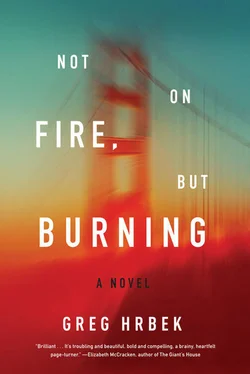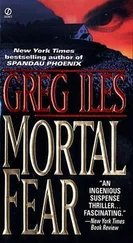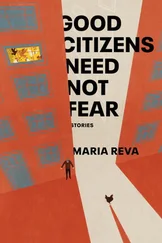The windows were down. Cool night air flowing through the car. On the dashboard, a dead cicada. The way the wings were trembling, it looked like the insect was about to come back to life.
“I’m worried—”
“About what? The future, or your neighbors? I know perfectly well why you came tonight. To buy the old man some time. Well, let me tell you, he doesn’t have much. People are upset.”
“He’ll go to trial,” I said.
“There won’t be any trial. He hasn’t even been arrested. The old man knows his shit. He fired the shots from within a legal radius of his front door. So the hands of the state are tied. Again. And I say ‘again’ because this isn’t the first time he’s gotten away with murdering an American. He did it in Gulf War III. I found a guy from the company he worked for. He shot another PMC. Blew his head off. And then skipped out of country with a bank account full of blood money.”
Suddenly, we were at the intersection of Cherokee and Poospatuck. He parked and we sat there, the engine idling.
“It’s been a pleasure,” he said.
“Yeah, but—”
“Yeah but what, Dorian? Let me assure you of something. What the old man did will not stand. Stay out of it. I’m warning you. Don’t get involved. As for the Muslim kid. He’s a very dangerous type. He’s got nothing to live for, but he could have plenty to die for. Common sense dictates: Don’t wait and see. But for you I’m willing to wait. If you promise me something in return.”
“Promise. What?”
Staring through the windshield into the darkness, he said: “Promise you’re with me when the time comes.”

It is (to the mind of Will Banfelder) not an irony, but more like a trick from up the sleeve of an asshole god, that no sooner does a kid get rescued from the surreal margins of war than he is swept up in the mainstream of its terrors. Ethically speaking (just his opinion, of course), the camps were nothing short of malignant neoplasms on the body politic. But despite the myriad injustices of the institution (to say nothing of its especial dangers and horrors), it did have the one fringe benefit, resultant of bumfuck geographical location, of at least keeping innocent children safe from some of the sicker shit that people plan and perpetrate in the name of their asshole gods. I mean, seriously: Tell you what, kid. We’re going to let you out now (no hard feelings), we’re going to make the fence and the psychopathic flying machines disappear (mecca lecca hi, mecca hiney ho), but, be forewarned, it has been determined that freedom can be hazardous to your health and may result in death, permanent disfigurement, emotional trauma (or all of the above) by explosion, poison, and/or pathogen. Rest assured, however, that when intelligence and law enforcement agencies determine that the communication between those sons of bitches who seek such outcomes becomes so active that projected dangers rise to the level of imminent probabilities, we will send you a convenient alert via home screen widget synched directly with the national advisory system that sounds as follows … When Will heard it yesterday, he was drinking a beer and streaming a replay of the game from the night before, a classic pitchers’ duel which (to his mind) was worthy of a second viewing, in the same sense that great books should be read more than once. He touched the screen of his phone and skimmed the text, then went directly upstairs, where he found Karim on his bed with his phone in his hands and the signal still sounding.
Will said: “Do you know what this is?”
Karim nodded.
“I don’t want you to worry about it. Okay?” (Taking the phone from his hand and silencing the screeching.) “This happens all the time. They’re always raising the level and then nothing happens …”
Next morning, upon discovering what did happen (not nothing, but for all intents and purposes nothing), Will feels pretty good about his handling of the crisis so far. He told the perfect lie, the type of lie a father tells for the good of his child ( happens all the time, nothing to worry about ), which is not a lie so much as a calculated exaggeration of the unlikelihood that things will be anything but all right in the end, which is what kids, and maybe all of us, need to hear and want to believe as long as circumstances allow for the believing. So, now here they are, father and adopted son, at the breakfast table, watching coverage of the crashes on the little flatscreen mounted on the kitchen wall where once upon a time there hung a clock with hour, minute, and second hands, when the doorbell rings. Get up and check it out. Slide your hand inside your unbuttoned shirt and feel for the gun in the holster. Peer through the window panel. On the porch are two people. Of Arabic descent. The kid Karim met at the mosque and his uncle.
Through the window: “Marhaban, effendi.”
He opens the door.
Whereupon the guy takes him by the shoulders and kisses him two times on each cheek, as the kid says: “Marhaban, eboo Karim. Is he ready to go?”
“Go where?”
“Have you forgotten, effendi?”
And the uncle goes on to remind him that it had been arranged last week that the boys would play again today, we were to come here and collect him and they would once again spend the day together — and although, while the man is speaking, there is a thought in Will that something is off about his eyes (like he’s blinking without closing them, as if there’s a third lid as with certain species of birds and reptiles, a kind of shield that doesn’t jibe with the fondness for honorifics and the predilection for cheek kissing), the idea gets lost in the illogicalities of the issue at hand.
“The playdate, right. Slipped my mind, but given the current state of emergency, don’t you think …”
Touching the boy’s shoulder, the uncle says. “Ebnee, why don’t you go say hello to your friend. May he, effendi.”
“Na’am.”
Then, after he’s out of earshot: “Best to not discuss this matter in front of the boy. He knows, of course, but why dwell on it.”
“You’re out in public,” Will says. “I’m not so sure that’s a good idea.”
“No?”
“They’re firebombing mosques. A guy got dragged behind a truck in Texas.”
The uncle looks away and manages a smile. “You are … a good man. But this is not Texas, sadiqi. Even if it were, I would not hide inside my house for fear of what might be done to me. As for my nephew, he has spent enough of his life living like an animal inside a pen. But forgive me …”
But the thing is: Will Banfelder doesn’t disagree, not in principle, not in his heart. Not that there isn’t a counterargument founded on concepts like caution and forbearance, the integrity of which he recognizes. But this current state of affairs could go on for days, even weeks. Are you going to watch over the boy every moment? And doesn’t the therapist feel that this relationship (with a friend whose personal history so closely parallels Karim’s own) is one to encourage, one that will facilitate both the processing of grief and the adaptation to a new life and world? End result: You let him go. You agree to allow him to get in a car with a man you don’t really know the first thing about. Not entirely comfortable with the situation, but accepting of its discomforts, although, as you walk them to the car (which you notice is not electric or even a hybrid, but runs entirely on fossil fuel), you feel oddly troubled by the fact that Karim didn’t say anything this morning (such as, it’s almost ten, they’ll be here soon ), as if he, too, had forgotten, yet saying a few minutes ago that, no, he had not forgotten, and yes, he still wants to go, though there was something unusual about the way he said so. And now, at the car, something more than unusual. You say: “See you soon, bud.” And he, standing by the open back door as if at a threshold, pauses. Then steps suddenly back toward you. The way he does it is awkward and hurried, and the action itself is incomplete. But what he’s doing is clear. He is putting his arms around you. Then the door is closing and your son of three weeks is on the other side of the door, the car is backing away, the man glancing at you through his window, and you imagining again, as you make eye contact with him, that strange blink, that drawing-across the eyes of a translucent shroud as in creatures inhuman … Despite these portents, you let him go.
Читать дальше













